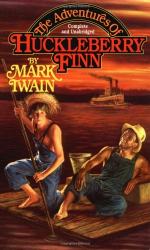|
This section contains 615 words (approx. 3 pages at 300 words per page) |

|
Superstition and the Adventures of Huckleberry Finn
Summary: Describes the use of Superstition in the Adventures of Huckleberry Finn, by Mark Twain. Examines how Mark Twain uses superstition to show the contrast between an organized, Christian religion and believing in superstitions and one's own beliefs.
In Mark Twain's novel The Adventures Huckleberry Finn, superstition is used throughout the story line, having a strong effect on the characters Huckleberry Finn and Jim as they escape to freedom from slavery and civilized living. Mark Twain uses superstition to show contrast between an organized, Christian religion and believing in and superstitions and one's own beliefs. As Huckleberry Finn and Jim are hurled back and forth between these two different faiths, the reader gets a keen idea of the beliefs and lifestyles people followed living on the Mississippi River. Overall, superstition is used in The Adventures Huckleberry Finn as a way to share Mark Twain's own opinion on religion and refined living with his readers and help them to understand the good and bad of both ways of living.
From the very first chapter of The Adventures Huckleberry Finn, the battle between civilized living and uncivil living...
|
This section contains 615 words (approx. 3 pages at 300 words per page) |

|


